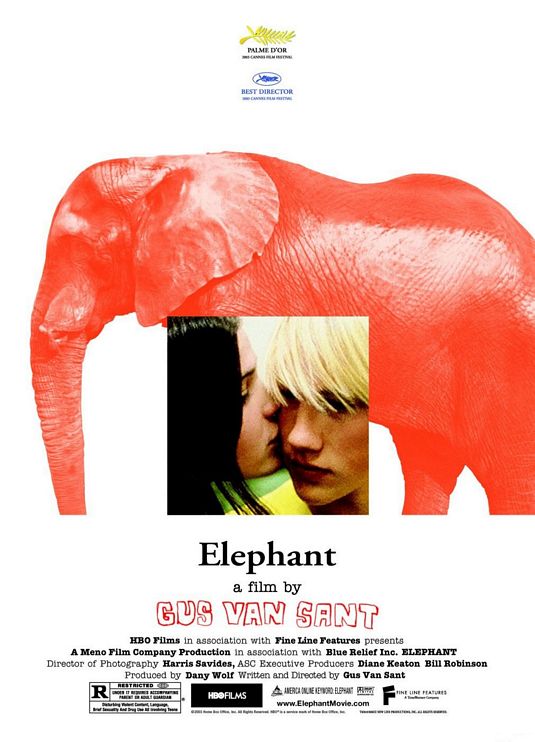
| None | Light | Moderate | Heavy | |
|---|---|---|---|---|
| Language | ||||
| Violence | ||||
| Sex | ||||
| Nudity |
Content:
(H, HoHo, PC, LLL, VVV, SS, N, AA, DD, M) Humanist postmodern worldview about students being gunned down by two of their peers, with strong homosexual content includes students discuss in class whether you can tell if someone is homosexual and two male students kiss in the shower, and possible politically correct viewpoint about homosexuality; at least 25 obscenities, including many “f” words, four light profanities, obscene gesture, and sounds of girls forcing themselves to vomit after eating salads; some bloody, very intense and disturbing violence includes teenage boy calmly plays violent video game shooting people (some in the back), teenage boys shoot fellow students at point blank range, blood splatters library books, blood smears on school floor, student shoots teacher in the back, teenage boys fire new automatic weapon into woodpile; teenage boys kiss in shower; rear female nudity of girl in gym showers in long shot and teenage boys shown naked from waste up as they kiss in private shower; teenage boy stops drunken father from driving; cafeteria employees smoke marijuana; and, deceit and teenager thinks killing people in real life is fun and humorous.
GENRE: Drama
H
HoHo
PC
LLL
VVV
SS
N
AA
DD
M
More Detail:
ELEPHANT offers no solid answers as to why the murders took place, though it suggests that violent video games, media violence, parental neglect, and sexual repression may each have played a role. The movie is bookended by shots of clouds rolling by in the sky, suggesting that nature is oblivious to humanity and its issues. This seems to be a relatively humanist, heartless way of looking at human life and teenage violence.
A few pundits have suggested that ELEPHANT’s writer/director Gus Van Sant has made a pointless, aggravating movie that adds nothing to the school-shooting phenomenon that plagued the U.S. a couple years ago. Most, however, have found the movie a harrowing experience that, in their minds, wisely tells viewers to avoid easy answers, including “easy” solutions, such as cutting down or eliminating video game violence.
Letting viewers make up their own minds about events is, indeed, a valid approach for a filmmaker. Most of the activities the student victims do before the shootings, however, are rather aimless, just as aimless as the way in which the murderers pick out their targets. This also indicates a humanist worldview.
ELEPHANT contains, however, one short scene of a science teacher in his class, and there are shots of another class talking about whether you can tell if someone is homosexual or not, just by the way they act and dress. The camera also follows one student working on his school photography to build his professional portfolio. In another subplot, a student, John, is shown coping with his drunken father as they drive to school. John leaves his father in the car, to be picked up later by his brother, and drops the car keys at the principal’s office for his mom to pick up. Afterwards, when John and his father meet outside the school while the murderers kill their victims inside, there is a palpable, though understated, sense of relief in both John and his father as they find out that each other is unharmed.
Thus, there seems to be little real academic activity occurring at this school. The audience doesn’t know if Van Sant simply finds such activity uninteresting or if he is actually making a comment on the aimless quality of so many public high schools in America. Either way, ELEPHANT is so bereft of perspective that it ultimately does come across as a somewhat pointless exercise. The killers come off as the most strongly developed characters, and the homosexual references seem to be the most gratuitous elements of all. At least, the movie doesn’t over-sensationalize its violent topic, though the issue is sensational enough.
Please address your comments to:
Mark Ordesky, President
Fine Line Features
Robert Shaye and Michael Lynne
Co-Chairman/Co-CEO
New Line Cinema
116 North Robertson Blvd.
Suite 200
Los Angeles, CA 90048
Phone: (310) 854-5811
Fax: (310) 854-1453
Web Page: www.flf.com
SUMMARY: ELEPHANT, the winner at the 2003 Cannes Film Festival, is an experimental movie based on the deadly school shootings at Columbine High School in Colorado. Despite some captivating moments, ELEPHANT ultimately comes across as a pointless, aimless exercise, because it declines to take a strong stand on anything.


 - Content:
- Content: 

